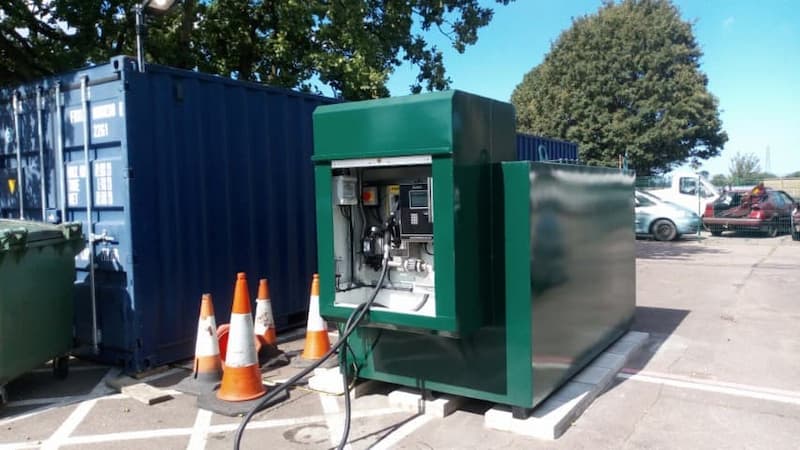Safety Precautions for Diesel Storage
Diesel fuel is an essential resource for many businesses across the nation. Hundreds of companies need an ample supply of this vital fuel to run their operations, whether it’s fuelling generators, running industrial machinery or supplying their commercial delivery fleets.
One goal that unites all these sectors is the need to have diesel readily available. The solution for this is to invest in onsite diesel fuel storage.

Benefits of Onsite Diesel Fuel Storage
Onsite fuel storage solutions are growing year by year. There are many benefits to investing in your own diesel fuel stock, one of the most prominent being efficiency. Having your drivers fill up at your own diesel pumps is an invaluable tool for optimising your fleet’s operations. You can eliminate the need for them to find a local fuel station, and they can focus on the task at hand. It can also be cost-effective with the ability to purchase fuel in bulk at wholesale prices and store it onsite for your drivers, making your expenses more efficient and your operations.
Regulatory Compliance With Fuel Tanks
A collection of essential guidelines must be adhered to when storing diesel fuel onsite and understanding the importance of the following regulations:
- The oil and storage regulations for businesses 2001
- The dangerous substances and explosive atmospheres regulations 2002.
There are many elements to these extensive pieces of legislation. Still, the main features are all relevant to preventing any unexpected disasters such as contaminations, leaks or even explosions that could be potentially lethal.
Pollution prevention is a major concern when storing diesel fuel. Therefore, this part of the regulations is relevant to above-ground oil storage for commercial and domestic tanks. There are slight changes to these regulations depending on location. Hence, it’s worth reviewing the local amendments, such as the water environment (oil storage) regulations 2006, that are relevant to oil storage in Scotland. The environmental agency has published detailed pollution prevention guidelines to assist businesses that choose onsite fuel storage.
Fire safety regulations are a natural concern when working with flammable and explosive substances such as diesel fuel. For safety, you must consider your desired capacity when deciding the location of your fuel storage. Non-domestic tanks with a capacity below 3,500 litres are required to be at least 2 metres away from the boundaries of any building. Tanks above 3,500 litres must be placed at least an additional 6 metres to provide adequate protection in case of a disaster. At Fueltek, we supply high-quality bunded fuel tanks with bespoke capacities to suit every client’s needs. Our tanks range from a humble 1000 litres to an impressive 130,000 litres, with additional sizes available upon request.
Tank construction is essential to prevent leaking fuel that will be a hazard to the environment and significant waste on fuel efficiency. For this reason, all fuel storage tanks must meet the safety requirements to be a contained unit that won’t be a hazard. As experienced suppliers of effective fuel management systems, bunded fuel tanks are highly recommended for a safer, more secure tank for your storage needs.
Bunded diesel fuel tanks provide a second protective layer called a bund (hence the name). These tanks have a second external tank that will give more protection to the surrounding environment as the extra containment is entirely watertight as it surrounds the inner tank. The combination of the two can hold 110% of the contents of the internal tank. This contains not only leaks but also any accidents when filling it up. You want to ensure that you have plenty of fuel to suit the needs of your fleet, but we recommend that you only fill the tank up to 85% to leave room for expansion and avoid spillages. Efficiency is excellent for business, but when it comes to fuel storage, you must pick a tank with a larger capacity than necessary to compensate for future growth in your fleet.
Fuel Tank Maintenance Checks
Like the maintenance checks you put your fleet of vehicles through, your storage facility should follow suit. These checks should be repeated at least once a quarter but should increase if your area has recently suffered from dramatic weather such as a storm. Additionally, your fuel tank should be in an isolated area away from the activity of your operations, but even then, there is a small potential for an accidental collision. If this occurs, inspection is vital and immediate to find any potential damage and fix it. Additionally, any attempts at theft may leave lasting damage on your tanks and should also add concern for a maintenance check.
If your maintenance checks have revealed an issue with your tank, you need to ensure you can address it safely. Specific topics that should be noted are that hotwork should only be performed when the tank has been emptied of fuel and purged of vapours. Hotwork is any process that can ignite flammable materials, such as welding. Leaks and spills should also be contained within the vicinity of the tank as soon as possible.
We at Fueltek have a great deal of experience in constructing bespoke onsite fuel tanks for a broad range of clients and are accredited as a safe contractor that you can rely upon to provide practical, safe and cost-effective results.










